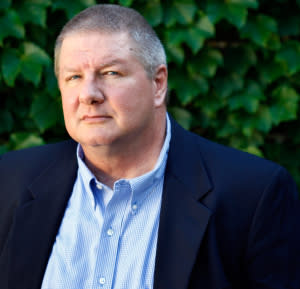Jonestown Massacre Biographer on the Question: How Successful Would Jim Jones' Cult Be Today?
Jeff Guinn doesn’t like the expression “drinking the Kool-Aid.”
First, he says, it’s inaccurate: Most of the 918 people who died in the 1977 Jonestown massacre in a remote commune in Guyana, in South America, actually killed themselves by drinking a cyanide solution laced with Flavor Aid, an inexpensive knock-off.
More troubling to Guinn is the glib judgment implied in that expression - and how it has too simply come to represent the willingness of fools to follow deranged leaders.
As Guinn found out while researching and writing The Road to Jonestown: Jim Jones and the Peoples Temple, released in bookstores on Tuesday, most of the people involved had a highly-evolved moral intelligence. They were sympathetic and even admirable.
As such, they were susceptible to Jim Jones.
Jones, founding pastor of the Peoples Temple and the architect of the massacre, was the rare demagogue who appealed to the better nature of his followers, Guinn says. And he had a track record of fighting for civil rights and altruistic causes.
Guinn explains, “Most demagogues work from a negative angle, but Jones recruited from the aspect of, Let’s all work together and make this a positive world.’ ”
Guinn - the author of several bestselling books, including a 2013 biography of Charles Manson - credits Jones with almost single-handedly integrating the Indianapolis public schools in the 1950s.
Luminaries including former First Lady Rosalynn Carter, former Vice President Walter Mondale and California Gov. Jerry Brown lauded Jones’ church for its charitable efforts - such as drug treatment, free college tuition for impoverished youth and clothing giveaways.
Former San Francisco Mayor Willie Brown once described him as “an American Gandhi.”
“That’s Jones’ special, awful gift,” Guinn says. “To be able to lure in people with the best of intentions and not people who are out to keep what they have and keep other people in their place.”
Guinn came to his new project wondering how, exactly, seemingly intelligent, high-minded people could succumb to Jones and believe the outlandish things he told them.
The answer, he learned, was that Jones revealed his controlling and abusive nature incrementally. Guinn uses an analogy: If a frog is placed in a pot of boiling water, it will jump out immediately. But if the frog is placed in lukewarm water that is slowly heated to a boil, it will stay until it dies.

By the time Jones’ nature revealed itself - and, eventually, his plans of “revolutionary suicide” - church members were in too deep, according to Guinn. It was more convenient to concoct explanations than face reality head-on.
Guinn says church members condoned Jones’ staged faith-healing stunts - in which he claimed to remove tumors that were actually rotted chicken guts - by rationalizing them as necessary means to bring people into the church. They tolerated his rampant sex abuse, with victims as young as 14, because Jones had convinced them that what was good for him was good for the church, which was good for the world.
It all culminated with the Jonestown massacre, which Guinn cites along with 9/11 and the Kennedy assassination as the American tragedies most likely to be remembered by future generations.
The large-scale poisoning is often referred to as a “mass suicide,” but Guinn says that characterization ignores the fact that many victims, including children and infants, were forcibly injected. Many more drank the poison under threat of armed guards.
A Dual Nature
Jones said he wore his signature sunglasses because his eyes burned with such great power that people couldn’t look at him directly.
In reality, the sunglasses concealed that his eyes were bright red from the large amounts of drugs he was taking - a habit the fueled his escalating paranoia and grandiosity.
Despite his apparently utopian vision, Jones was in many ways the archetypal demagogue, as Guinn highlights in his book.
The author traces Jones’ inflated sense of his importance to his mother, who claimed she was reincarnated from great people and had a vision that she’d give birth to the greatest man ever born.
Jones had been a strange child, displaying uncommon sensitivity but also an attraction to the monstrous: The same boy who conducted a funeral service for road kill also became fascinated with Hitler, believing the German dictator’s suicide had been an admirable act.

Jones was defined by this duality, and his final act showed how perverted the Peoples Temple’s original vision had become: What started as an inclusive, uplifting vision had turned inward and bleak. The shepherd who sought to protect his flock had morphed into the general sacrificing his soldiers.
“All of us like our villains to be completely evil. But for somebody like Jones, there was good and bad about him,” says Guinn, who adds, “If Jim Jones had gotten hit by a car and killed in the late 1950s, we’d probably remember him as one of the great figures of the civil rights movement.”
And what if he were alive today?
Guinn says Jones’ preternatural charisma, resourcefulness and political instincts would play in any era. One of his goals for the book, he says, is to show that there are “classic signs of any demagogue. And in America, we need to be better at recognizing them.”
“If Jones is alive today, he’s going to master social media. He’s going to use Facebook and Twitter to get his message across unfiltered,” Guinn says.
“If Jones is alive today, I think he’d be in elected office - maybe even the highest office.”
The Road to Jonestown: Jim Jones and the Peoples Temple is in bookstores now.
